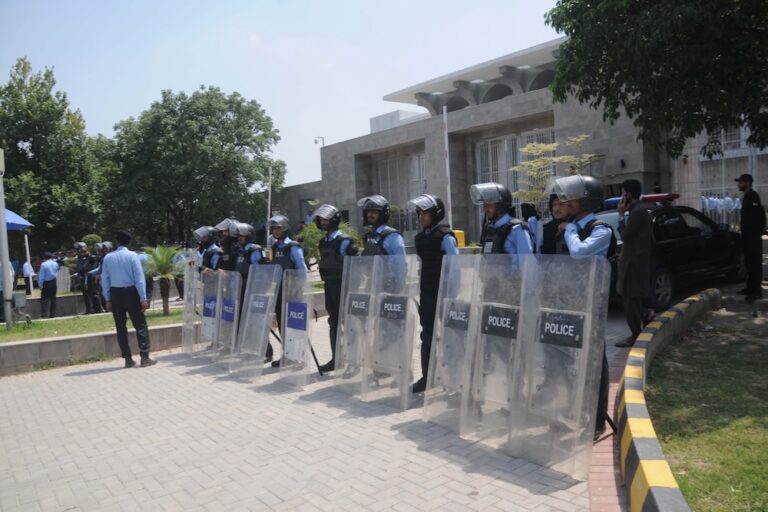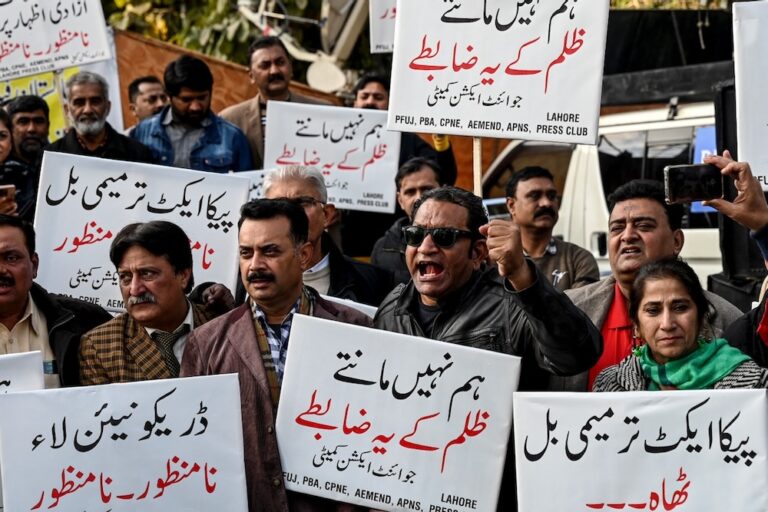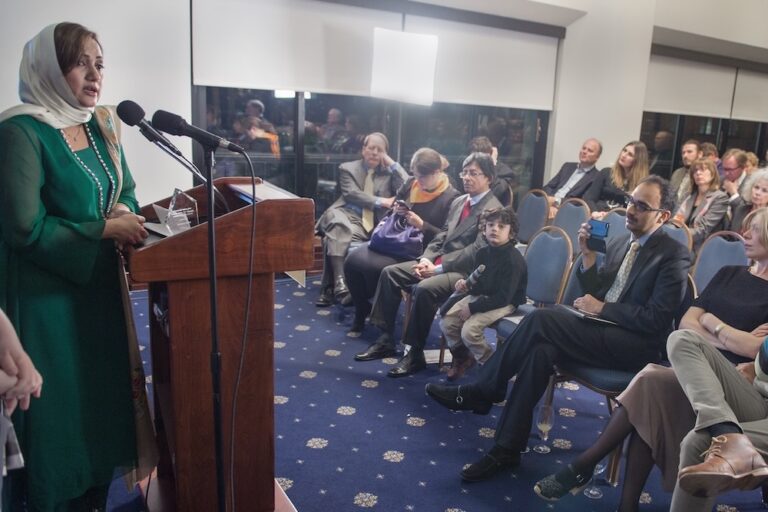(CPJ/IFEX) – The following is a CPJ letter to Pakistani President Gen. Pervez Musharraf: July 30, 2001 Committee to Protect Journalists 330 Seventh Avenue — 12th floor New York, NY 10001 His Excellency Gen. Pervez Musharraf President, Islamic Republic of Pakistan Islamabad, Pakistan Via Facsimile: 92-51-922-4206 Your Excellency: The Committee to Protect Journalists (CPJ) is […]
(CPJ/IFEX) – The following is a CPJ letter to Pakistani President Gen. Pervez Musharraf:
July 30, 2001
Committee to Protect Journalists
330 Seventh Avenue — 12th floor
New York, NY 10001
His Excellency Gen. Pervez Musharraf
President, Islamic Republic of Pakistan
Islamabad, Pakistan
Via Facsimile: 92-51-922-4206
Your Excellency:
The Committee to Protect Journalists (CPJ) is concerned that the prosecution on drug charges of Rehmat Shah Afridi, owner and chief editor of the English-language newspaper The Frontier Post and the Urdu daily Maidan, may be politically motivated. On June 27, a special anti-narcotics court in Lahore convicted Afridi on drug smuggling charges and sentenced him to death.
Several well-respected journalists in Pakistan have told CPJ they believe that the exceptionally harsh punishment is due in part to The Frontier Post’s history of publishing controversial stories, often attacking the country’s political establishment.
Afridi has been imprisoned since April 2, 1999, when agents from Pakistan’s Anti-Narcotics Force (ANF) arrested him in a predawn sting operation in Lahore. The ANF claims the agents found 21 kilograms of hashish in Afridi’s car and later recovered 651 kilograms of hashish in a truck allegedly owned by him. Afridi has repeatedly denied the charges and says he has been framed.
Journalists have noted that Afridi’s arrest followed a series of articles published by The Frontier Post accusing ANF officers of involvement in the drug trade.
As an organization of journalists dedicated to the defense of press freedom worldwide, CPJ does not take any position on Rehmat Shah Afridi’s guilt or innocence on drug charges. However, we believe that the widespread perception among Pakistani journalists that his prosecution is politically motivated and unjust merits serious attention.
Ignoring these doubts would likely lead to greater self-censorship on the part of the local media, thereby further eroding press freedom conditions. Journalists must be free to publish critical reports on all government agencies, including the Anti-Narcotics Force, without fear of reprisal.
CPJ urges Your Excellency to appoint a special committee, including senior journalists and legal experts, to investigate possible improprieties in Afridi’s arrest and prosecution. We ask that the panel’s findings be released publicly and look forward to the results of this inquiry.
We thank you for your attention to this urgent matter, and await your response.
Sincerely,
Ann K. Cooper
Executive Director
cc:
Maleeha Lodhi, Pakistani Ambassador to the U.S.
Wendy Chamberlain, U.S. Ambassador to Pakistan
Khyber Union of Journalists, Peshawar
Pakistan Press Foundation
South Asian Journalists Association
American Society of Newspaper Editors
Amnesty International
Article 19 (United Kingdom)
Artikel 19 (The Netherlands)
Canadian Journalists for Free Expression
Lorne W. Craner, U.S. Secretary of State for Democracy, Human Rights, and Labor
Freedom Forum
Freedom House
Index on Censorship
International Center for Journalists
International Federation of Journalists
International PEN
International Press Institute
Alain Modoux, Director, UNESCO Freedom of Expression Program
The Newspaper Guild
The North American Broadcasters Association
Overseas Press Club
Reporters Sans Frontières
Mary Robinson, United Nations High Commissioner for Human Rights
The Society of Professional Journalists
World Association of Newspapers
World Press Freedom Committee
Recommended Action
Similar appeals can be sent to:
His Excellency Gen. Pervez Musharraf
President, Islamic Republic of Pakistan
Islamabad, Pakistan
Fax: +92 51 922 4206
Please copy appeals to the source if possible.


